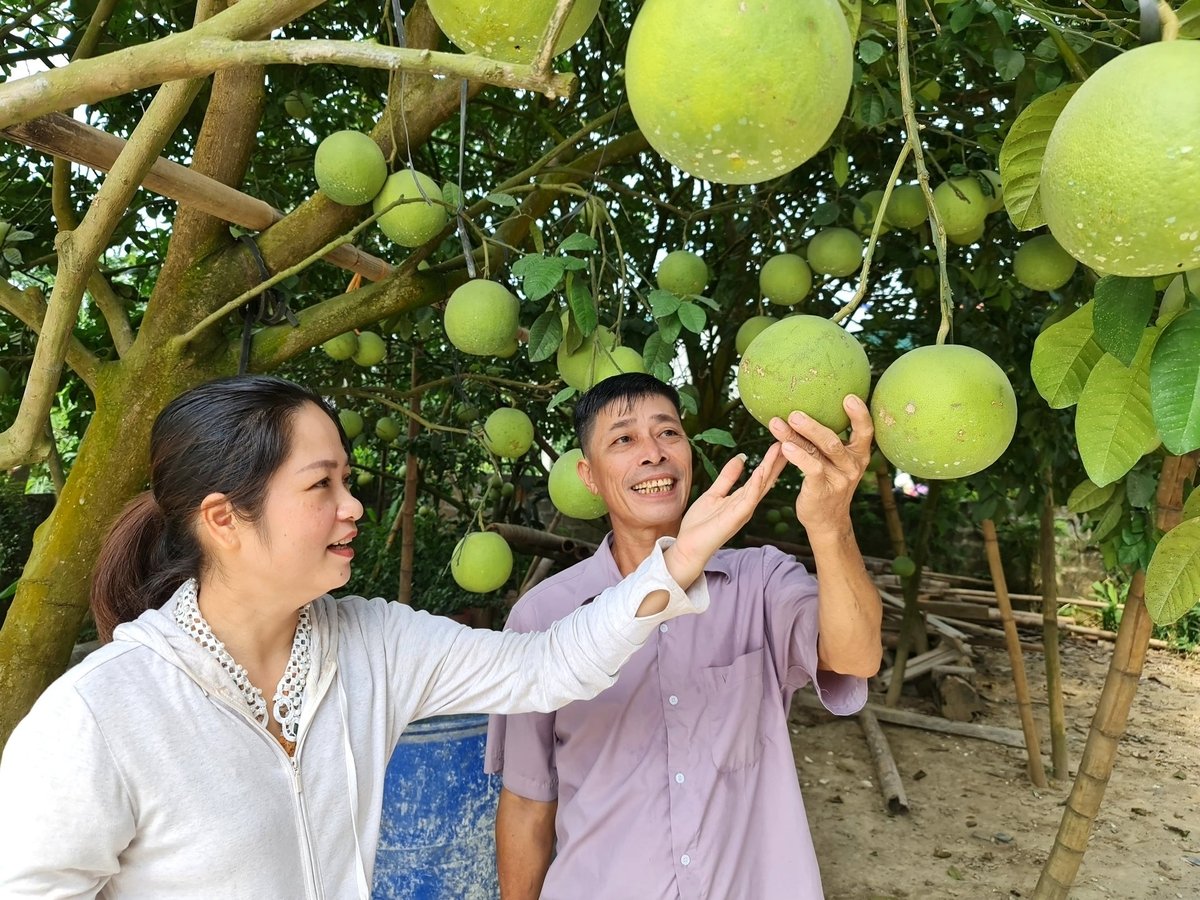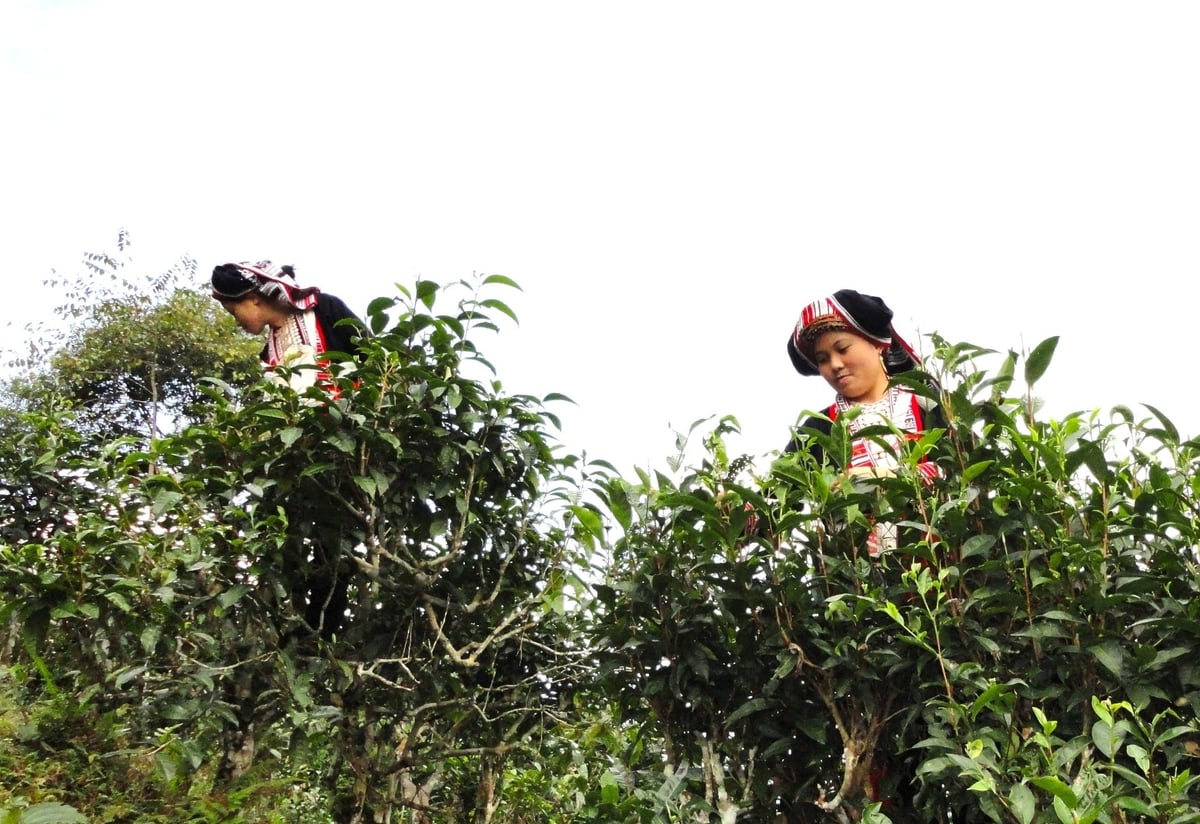November 12, 2025 | 02:49 GMT +7
November 12, 2025 | 02:49 GMT +7
Hotline: 0913.378.918
November 12, 2025 | 02:49 GMT +7
Hotline: 0913.378.918
At present, Tuyen Quang province has been granted 162 planting area codes for agricultural traceability, including 136 codes for domestic consumption and 26 codes for export to the Chinese market and several European countries.
The issuance of planting area codes not only enhances product transparency and builds consumer trust, but also meets strict requirements on quality and food safety, thereby expanding stable market opportunities and improving farmers’ incomes.

The granting of planting area codes has paved the way for Tuyen Quang’s specialty Soi Ha pomelo to reach international markets. Photo: Dao Thanh.
The province now cultivates more than 950 hectares of pomelo of various kinds, of which over 400 hectares of Soi Ha sweet pomelo have been granted a geographical indication certificate by the Intellectual Property Office under the Ministry of Science and Technology. Over the years, pomelo has established itself as the region’s leading crop, generating remarkable economic benefits and becoming a main source of livelihood for the people of Xuan Van commune, Tuyen Quang province.
In particular, the pomelo-growing area managed by the Soi Ha Pomelo Cooperative Group in Xuan Van commune has 10 hectares that have officially received planting area codes. To secure this recognition, 13 farming households in the cooperative have unanimously committed to adopting safe cultivation practices, implementing strict pest and disease management, and ensuring full traceability of their products. Each household is required to keep a detailed production logbook, allowing for careful monitoring of every stage in the growing process.
According to Mr. Do Khac Thoa, a pomelo farmer from Soi Ha village: “Since our planting area was granted a code, farmers here have become far more aware of the importance of complying with food safety standards. If we fail to meet these requirements and inspection samples do not pass testing, the Soi Ha pomelo brand - valued at hundreds of billions of VND - could suffer serious and long-lasting consequences.”
With the introduction of planting area codes, Soi Ha specialty pomelo has made its way into the United Kingdom - widely recognized as one of the strictest and most demanding markets in the world. This achievement marks an important breakthrough, as it not only enhances the reputation and brand value of Soi Ha pomelo but also creates a foundation for stable, long-term, and sustainable export opportunities for pomelo growers in the province.
Importantly, the emphasis on safe production standards is not limited to products destined for overseas markets. Planting areas intended for domestic consumption are also required to comply with strict safety and quality regulations. As a result, Tuyen Quang has developed numerous high-quality agricultural zones, producing well-known crops such as Shan Tuyet tea, pomelo, Canh orange, and sugarcane. These efforts have helped the crop sector account for more than 50% of Tuyen Quang province’s total agricultural production value.

Shan Tuyet tea – one of Tuyen Quang’s signature agricultural products. Photo: Dao Thanh.
In Khuon Lung commune, the Tuan Bang Trade and Transport Cooperative stands out as a notable example. In 2022, the cooperative was granted a planting area code for 30 hectares of Shan Tuyet tea - an organic tea area with trees over 50 years old. This tea-growing zone, located in Nam Khuong village, is jointly cultivated by 30 Tay ethnic households.
According to Mr. Phan Thanh Tuan, Director of the Cooperative, the tea area yields about 150 tons annually, with fresh tea leaves selling at an average price of 10,000 VND per kilogram. Some households earn as much as 100 million VND per year. The issuance of the planting area code has allowed Shan Tuyet tea from the cooperative to gain clear traceability, meet requirements for entry into demanding markets, and enhance the brand’s overall value.
To date, the cooperative has successfully developed three products recognized under the OCOP program: Tuan Bang Tea, Natural Black Tea, and Natural Green Tea. These products not only preserve the distinctive flavor of highland Shan Tuyet tea but also gradually bring this local specialty to a wider base of consumers.
According to Mr. Giang Duc Hiep, Head of the Tuyen Quang Sub-Department of Plant Production and Protection, local practice has demonstrated that planting area codes are a crucial solution for elevating agricultural products. The process of establishing and maintaining these codes compels farmers to shift their production mindset, strictly comply with technical standards, minimize the use of chemicals, ensure food safety, and protect the environment.
When products are granted planting area codes, the pathway to market expansion becomes much broader, with greater opportunities to connect with major export partners. More importantly, these codes help build trust among both domestic and international consumers, thereby increasing economic value for producers and contributing to the stronger development of Tuyen Quang’s agricultural brand.
$ 1 = VND 26.138 - Source: Vietcombank.
Translated by Phuong Linh

(VAN) From straw, coffee husks, to sugarcane bagasse, agricultural by-products are being transformed into new resources for a lower-emission future in crop production.

(VAN) The application of remote sensing technology and AI is becoming a strategic tool helping Viet Nam modernize agriculture management and implement smart environmental governance.

(VAN) From the early days, international cooperation has helped Vietnam’s agriculture sector broaden its vision, access knowledge, and achieve significant progress in development and poverty reduction.

(VAN) Over the past 80 years of formation and development, Quang Ninh has affirmed its pioneering position in resource management and environmental protection.

(VAN) Amid many hardships in distant Cuba, Vietnamese experts quietly sow seeds of knowledge every day, reviving once-barren rice fields.

(VAN) Numerous practical ideas, solutions, and proposals were presented at the national forum themed: ‘Rural Tourism Connected with Ecological Civilization and the Creation of a Green Living Environment.’

(VAN) TH Group is implementing multiple solutions to reduce white pollution, notably through the 'Collect Cartons - Spread Green Living' campaign and plastic reduction initiatives.